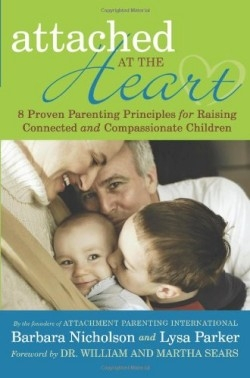Attached at the Heart
8 Proven Parenting Principles for Raising Connected and Compassionate Children
Babies cannot be spoiled. In fact, the more that babies are carried, held, and nurtured emotionally and physically, the more secure and healthy they will be. This is part of the simple, practical advice offered by child experts Barbara Nicholson and Lysa Parker, co-founders of Attachment Parenting International.
Attached at the Heart includes eight principles for raising “connected and compassionate children,” plus numerous tips and suggestions that should be copied and placed on family refrigerators for daily reference.
Nicholson and Parker’s well-documented and researched book promotes the necessity for parents to literally attach to their newborns. The authors write that attachment parenting “is designed to simulate the optimal development of children. It calls for a new consciousness in childrearing and encourages parents to learn to trust their intuitive knowledge of their child.” This knowledge leads to the development of a foundation of trust, resulting in empathy and compassion.
Parental–child attachment should begin before birth, and attachment parenting is incorporated into sleeping, eating, and play rituals.
The authors document how other cultures raise their children in extended village families, where the baby is always “attached” to someone, giving them security. This is compared to many American families, where infants are placed in daycare and may lack essential touch and bonding. Baby slings, gaining in popularity in this country, are more than a convenient method of carrying the infant in a grocery store or on a family hike. Slings are a significant part of bonding the baby to its parents.
One of the book’s more controversial chapters relates to sleep. The authors strongly urge parents to sleep in close proximity with their babies. They cite studies that show that infants are less likely to die from sudden infant death syndrome if they are sleeping near their parents, even if this means sharing a bed. As with most suggestions, the authors urge parents to trust their own judgment and “listen” to their baby, even if their decisions are contrary to friends, family, or pediatric advice. Listening to the baby or child means treating the child with respect. As adults lead by example, the children will follow.
Discipline should also be based on attachment principles and respect, not on an adult need to control a child through corporal punishment. They explain, for example, that the oft-promoted biblical rod was also a staff used by shepherds to guide, not beat their sheep.
Besides sharing their philosophy, the authors provide stories from other parents and quote other experts in the field. Pictures of parents and children are delightful and visually underscore attachment.
The book is written for well-educated readers and professionals. It should be required reading for daycare owners, social workers, and members of the judicial system. A simplified version would be worthwhile for parents who could benefit from the tips and message without the academic documentation.
The book’s advice is empowering and, if followed, could lead to a better world.
Disclosure: This article is not an endorsement, but a review. The publisher of this book provided free copies of the book and paid a small fee to have their book reviewed by a professional reviewer. Foreword Reviews and Clarion Reviews make no guarantee that the publisher will receive a positive review. Foreword Magazine, Inc. is disclosing this in accordance with the Federal Trade Commission’s 16 CFR, Part 255.

